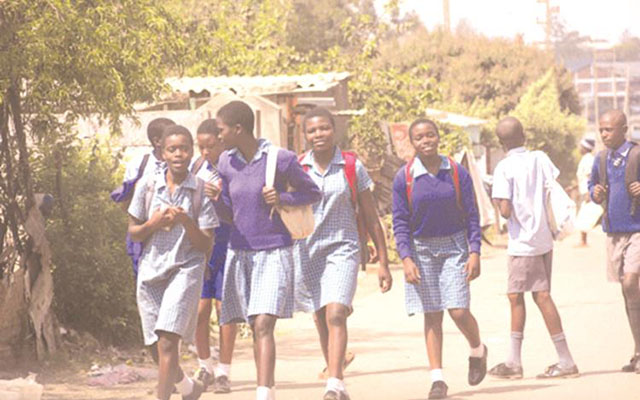Of education, snobs and social misfits


Pupils from George Stark High School walk home home after classes. The Mbare-based school was one of the several schools in the high-density suburbs previously categorised as Group B
Nick Mangwana View from the Diaspora
Our much vaunted education system has produced literate people and high achievers. It has set a foundation for many Zimbabweans have gone and excelled elsewhere. This is the authentic group that remained with their feet firmly planted on the ground whilst they fitted in different societies and communities they came across. But this same education has system has also produced highly read social misfits, imitators and egotistic fantasists. There is a need to have a look at how we came to be here.
At independence, Zimbabwe had a very racially biased elitist education system. There were few and poor schools in the townships for the black people. Then there were the elite government schools which were not paying a lot of fees but were still elitist in approach. These were the Chinhoyi High and Prince Edward type of schools. Group A schools were in low-density suburbs and Group B schools were in high-density suburbs. There were also Group C which were basically non-fee-paying primary schools in rural areas. Parents in Group C schools contributed by helping with building material such as helping to mould bricks or pay to a building fund. They also bought books and school uniforms. This is how this system came to be.
Under Zimbabwe-Rhodesia there was a new Education Act (1979). This allowed some window-dressed integrated education system where a few selected families could send their children to the likes of St George’s College in Harare. If they could not afford then some kind of scholarships would be put in place. Some of the beneficiaries of this system were the Chingoka brothers whose father was a senior police officer then. This was the period when schools were grouped into a three-tier system of Group A, B and C. Anyone who talks of having gone to a Group A school is just celebrating a Muzorewa legacy.
It was discriminatory in funding and resources with the fees and a zoning system being the barriers unless you were a member of the Capricorn Society. Parents had to play all kind of tricks for their children to access these well-resourced schools. Outside these were mission schools like Kutama, Gokomere, St Ignatius, St Dominic’s, Dadaya and the like. These had qualified religious leaders for teachers. Priests, monks, deacons and nuns were some of the teachers. These schools were popular with their own graduates who swore by them and in turn sent their own children there. So if a father attended Kutama and became a success, their son would continue the legacy by attending Kutama. Having had a parent who attended the same school was a recruitment advantage.
At independence the Government made an effort to remove these zones, build more schools and open more teachers’ training colleges to equip the schools with trained teachers. The Zintec (Zimbabwe Integrated National Teachers Course) were rolled out to try to meet the demand for teachers. Between 1980 and 1990 secondary schools increased from 197 in 1980 to 1 512. Enrolment in secondary schools grew 10-fold from 74 321 to 708 080 in the same period. Primary schools had an enrolment of 1 235 994 in 1980 but by 1990 it had grown to 2 281 595.
However, all these schools continued to be shunned by new elite. Of course, others started crossing the zones and those from townships started enrolling into these so-called Group A schools. There is no problem there. But the fact that one is an alumni of any of the Group A school does not make them a better person.
These schools were originally known to be contemptuous of Africanism. Some of the black people who attended these same schools started to change their way of speaking. It is known that the shape of our nose influence the way we speak tried to speak English like the Anglo-Saxons they so wanted to be like. This generated a sub-culture of the so-called Nose Brigades whose whole accent was artificial and in the main ridiculous. How they could take this out of place phonology as evidence of an attainment of a certain status is beyond this writer.
We are seeing here that the pervasive supremacist attitude has experienced a transference. Those who went to school with the “pikinini baas” are becoming “Baas” as well in their attitude. This is what generated this social stratum of these people considering themselves a social class above the rest. We have moved from white supremacist to black class supremacism? The stinking attitude of thinking that anyone who attended schools with no white pupils as classmates does not speak the right way. Really?
Of course, there are schools that tried all in their power to have an Anglo-Saxon upper class culture. This is a group that believes that they are an embodiment of enlightenment because they had classmates of a different race. This is the culture that has turned some of these little madams into wannabe whites who believe that speaking on TV with a Zimbabwean accent is embarrassing. English is our lingua franca but its not a sign of self-actualisation for the African. It is banal to believe that speaking with a pretend accent makes one better than their contemporaries who choose to speak naturally, eat their natural and culturally correct diets. But there is good news the real elite know that eating manhanga, muboora, sadza rezviyo, etc, is now the elite. Not super refined foods.
It was always part of the colonial project that Africans had to assimilate into the lifestyle of the European so that they could not be a threat to its identity. To that extent the success of this policy is seen in the fact that for one to be considered of a higher social class one has to adopt the European diet and speak with an air constricting articulation even though the natural way your nose expels air does not prescribe for that.
That this is a dehumanising effort is lost to the few that have a negative self-perception of their African heritage. It is good to speak a lot of languages and without a doubt it is great to speak English fluently because of the doors that it opens. But it is deplorable to try to speak it using regional accents of elsewhere. Evidence show that as part of cultural imperialism, it was instilled in the black Zimbabwean that if you cannot order fanciful Italian coffee or pronounce it exotically then you are a retrograde. This is despite the fact you are not only able to order your maheu beverage but brew some as well.
So this artificially enculturated social group are just a bunch that bought into the European hegemony of portraying anything indigenous to Africa as inferior. Accents indicate one’s ethnocentrism. Anyone can artificially adopt a foreign accent if they put their mind to it. Even those in township schools could have adopted the accent of their expatriate teachers had they so wished.
Those in mission schools could have chosen the accent of the missionaries as well. But their environment frowned upon any fakery and pretensions that they ended up just being “normal”. It is grand that there are those that have lived out of the country for close to 20 years but still proudly project the Zimbabwean identity.
They could have chosen to speak a Cockney dialect or so many other regional accents of their hosting communities but they have not. Whatever adjustments they might have done to their pronunciations came naturally as a way of fine-tuning in order to be understood.
Now in the Diaspora one cannot tell the person who went to Chemagamba High from the one who went to Peterhouse for their accent are pretty much the same. This vindicates the fact that the indigeneity cannot be erased. One can brag of drinking a macchiato at Waseefas or a latte at Pistachio but when all is said and done both father and daughter would want roora to be paid on marriage. That’s the indigeneity popping its pretty head.
The social segregation in the education system produced Afro-loathing posh wannabes with an appalling level of vanity which is exhibited in pretend social and cultural superiority. The only cultural superiority one can show is respecting one’s own culture.
The only evidence social superiority one can have is when one recognises that materiality is just social privilege and not superiority. Those two combined produce a socio-cultural superiority.
A Eurocentric African is by no means sophisticated but simply a hollow peddler of cultural vanity. An African with corrupted sensibilities which is in disharmony with their indigeneity is a dehumanised African. For one to understand this one has to realise that there was an expectation that the few Africans that were educated would have to imitate the European.
It worked very much before consciousness and Afrocentrism took centre stage in nationalism. Many have seen pictures of their fathers and grandfathers with their Afro-hair with what was known as a “shade”/ dharakishoni (declension) carved on the side. This was the native emulating the master whose hair was natural to the hairstyle.
But soon enough that changed and Afro-centric headgears started to appear on the scene. We had polarisation along racial lines. We do not expect some snobbish high society mindsets of either “been-to” or “has been” or even “wannabe” to undermine that which make us a people. We are a people because of our country, our culture, our diet and our manner of speaking.







Comments